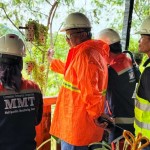Government moves decisively to stop illegal mining
It was a day like no other in Bayog, a town situated in the northwestern part of the province of Zamboanga del Sur. The sudden influx of government vehicles that converged at the municipal hall grounds, with government men and women milling about, indicated there would be some big activity coming. But certainly, judging from the seriousness of the faces of the visitors, this was not going to be a grand party like the yearly fiestas and town anniversaries the people were used to.
In the afternoon, the sight became more ominous. Trucks loaded with uniformed military and police began to arrive by the dozens. They were all carrying guns. Others who were not wearing uniforms had guns too, but clearly seen at the backs of their bullet-proof vests were the big three letters: NBI (National Bureau of Investigation). The arrival of the media completed the picture.
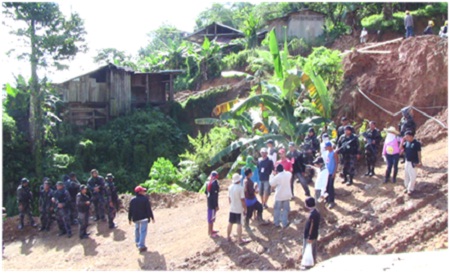
Strangely, the townsfolk did not panic nor even register alarm. They just went about their usual routine as if they knew all along that this was going to happen. Actually, the sight of it all just confirmed one thing in their minds – Balabag. Situated uphill around 20 kilometers from the town proper, Balabag is where the illegal miners operated for many years. This is also the place where crime, lawlessness, loose firearms, environmental destruction, and child-labor abound in their mad rush to get gold. “Maayo ra pud, para moundang na ang patay diha,” (That would be better off, so killings will stop there) said one resident who earns his living driving a pedal-powered tricycle called trisikad.
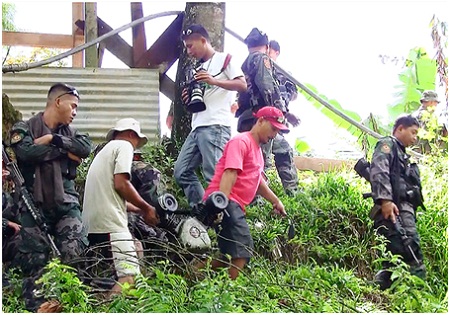
True enough, town mayor Leonardo Babasa, Jr., in a briefing with media at his residence, said that the government will finally stop illegal mining in Balabag. “This place has been the center of crimes and lawlessness and we want peace and order to be restored over the place,” he added. Somewhere else around town, people from government agencies also held similar briefings.
“Finally, the government will show its political will to put an end to the illegal mining activities in the area after so many years,” said one radio broadcaster from Pagadian City.
Then Mayor Babasa laid out the plan. “Tomorrow, October 24, the Cease and Desist Order (CDO) issued by the Mines and Geosciences Bureau (MGB) will be implemented against the illegal miners. The provincial government and the DENR’s MGB and Environmental Management Bureau (EMB), supported by people of the local government unit of Bayog, will implement the said order by disabling or confiscating implements, machineries, structures and materials used for illegal mining. The police and the military will ensure that the implementation is done peacefully,” Babasa informed.
At the break of dawn, a hundred Philippine National Police (PNP) officers proceeded to the place on board transport vehicles. The massive number of enforcers might be construed as overkill, but what happened next justified their presence. A powerful bomb exploded in their path. It blew off just as when the lead vehicle occupied by the provincial chief of the police, Police Supt. William Manzan passed by missing his vehicle by a few feet. The bomb’s crater was a meter deep, powerful enough to overturn a vehicle and kill all its occupants.
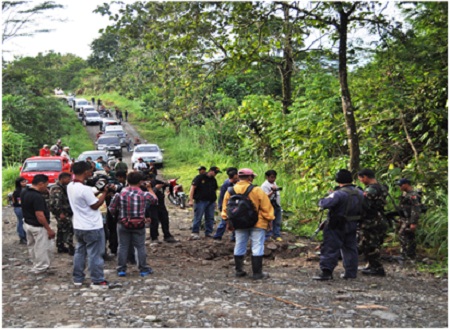
Fortunately, no one was hurt. “It was meant to just scare us away,” said one army official. “The absence of splinters in the bomb is unusual for Improvised Explosive Devices. Upon impact, all that struck on our windshield were mud and dirt. Besides, the bomb was placed by the roadside and not in the middle,” he concluded.
In such operations, violent resistance is not discounted. After all, the raid of the Criminal Investigation and Detection Group (CIDG) a week before yielded 13 high-powered firearms, a grenade, detonating cords, cyanide, and nitric acid (the component used in making explosives). This included the arrest of a number of suspects working for the financiers.
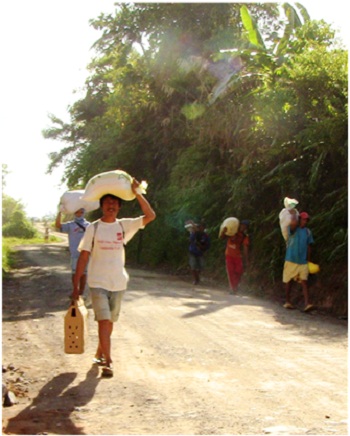
The rest of the day, however, was uneventful. Resistance of any kind was not encountered as the teams proceeded to dismantle and incapacitate the mining implements. It seemed that the place was abandoned by the operators beforehand. And only workers who resided there were left to fend for themselves. Everything went well as planned.
“They don’t pay taxes to the government,” said town Councilor Celso Matias. They destroyed the environment, according to the testimonies submitted to NBI of Barangay (village) Captain Romeo Sungcad and village councilor Antonio Mancao of Barangay Depore. Also, provincial Governor Antonio Cerilles declared that their use of harmful chemicals had contaminated the bodies of water in Sibugay valley, the sources of irrigation waters for the wide expanse of ricelands in Zamboanga del Sur and Sibugay province. They might even have caused the recurring red tide in Dumanquillas Bay, he added.In the course of their illegal mining operations in Balabag, some financiers have enriched themselves immensely. One became a town councilor. Councilor Julito Monding, one of the biggest financiers, is now running for the mayoralty seat in Bayog. He is believed to have earned PhP1 million a day in Balabag. Monding heads around 40 other financiers who put up processing plants in the area. With several others, Monding is now facing criminal charges of illegal possession of firearms, explosives, cyanide, and nitric acid aside from violations against mining laws.
But on this day, the destruction wrought by illegal mining in Balabag hill had finally come to a stop. The glitter of illegal gold that blinded lawless elements from sensibility has now faded away. Sadly, it was the same glitter that tempted some people in the government who allowed the illegal trade to thrive and flourish for three decades in the first place. (Joseph Arnel Deliverio)

